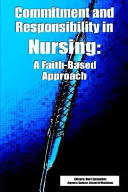Commitmen t and Responsibility in Nursing: a Faith-Based Approach
t and Responsibility in Nursing: a Faith-Based Approach
This book brings together an impressive international panel of nursing scholars to explore what it means to be a Christian in nursing today.
The focus is on nursing ethics with the perspective of professional responsibility. Beginning with a firm philosophical and theological base, it is also delightfully practical. The authors seek to make us more confident about our Christian values and more articulate in defending them in our work settings.
Divided into three parts, the book seeks to answer three basic questions from a Christian perspective. The answers form a thread in each chapter:
- What is our professional responsibility in regard to the relationships and situations we encounter in nursing?
- What kind of ethical issues might we face in seeking to fulfill these responsibilities?
- How can we effectively deal with these situations?
Part one looks at the Christian origins of nursing and the beliefs that shaped it. Dutch nurse-philosopher Cusveller defines the nurse's professional responsibility as moral accountability to both God and the professional nursing community to provide optimal care for every patient. British nurse-historian Ann Bradshaw examines the history of nursing in the United Kingdom, asserting that modern nursing has forgotten its Christian moorings and subsequently lost much of its sense of purpose. Finally, American nurse-theologian Arlene B. Miller presents the ethics of spiritual care, arguing that restoring a person's relationship with God is the ultimate spiritual need.
Part two looks at our professional relationships with patients, nursing colleagues and other health care professionals. Theologian Kees Kleingeld suggests three basic responsibilities of nurses toward patients: practical nursing care (nurturing), accompaniment (emotional support) and representation (advocacy). Taiwanese nursing leader Fu-Jin Shih presents several nursing situations where nurses disagree and suggests appropriate ways that Christians can be peacemakers through demonstrating respect and seeking to understand the views of others. Dutch pastor Jan Van der Wolf offers practical suggestions for fostering good collegial relationships with other health care professionals.
Part three examines the moral tensions in three controversial issues. Dutch nurse Ada van de Scheur addresses the issues surrounding euthanasia and palliative care. Irish-American ethicist O'Mathúna provides a critique of alternative therapies, and then joins with Cusveller to examine the issues surrounding intimacy and sexuality in patient care.
Overall, this book presents significant new material that will challenge readers to view nursing as a moral pursuit. It clarifies our responsibilities to God, our patients and our colleagues in fresh and compelling terms. In the words of the editors, “This book articulates an understanding of nursing as a profession and practice shaped by the tradition of Christian values. The authors' goal is to promote patient care that respects the dignity and life of each and every patient. In so doing, we encourage Christian nurses to remain true to their Christian tradition by bearing witness to it in both word and action…. But above all, we are seeking to provide the tools and attitudes that Christian nurses need to engage in debate and dialogue with the world around them” (p. 11).
They have done their job well.
—Reviewed by Judith A. Shelly, DMin, RN
(Adapted from a book review originally posted in the Journal of Christian Nursing, Spring 2004)